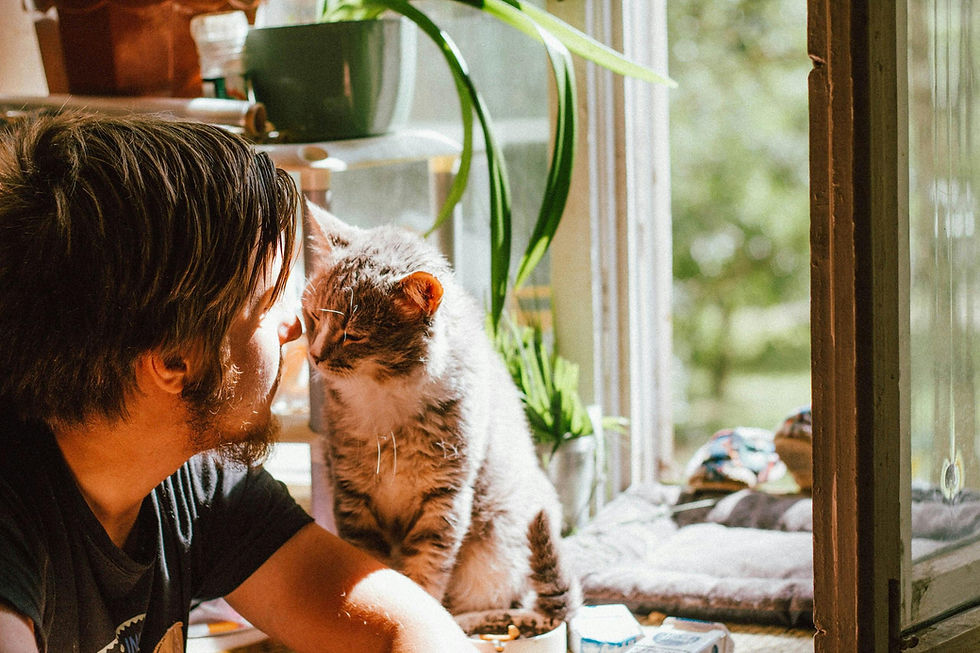A Guide to Bird Care: Ensuring Health and Wellness for our Feathered Friends
- Apr 29, 2024
- 3 min read
Updated: Mar 20, 2025

With their colorful plumage and enchanting songs, birds make excellent companions for enthusiasts of all ages. Whether you're a proud owner of majestic macaws, serene doves, melodious canaries, playful parakeets, vibrant conures, charming cockatiels, talkative parrots, or affectionate lovebirds, providing proper care is crucial for their health and well-being.
Proper Nutrition:
A balanced diet is essential for the health of your avian friends. Provide a variety of fruits, vegetables, seeds, pellets, and formulated diets specifically designed for your bird species. Avoid feeding birds avocado, chocolate, caffeine, alcohol, and high-fat or high-sodium foods, as these can be toxic. Consult with your My Pet's Vet avian veterinarian for dietary recommendations tailored to your bird's species and individual needs.
Clean Water and Hygiene:
Ensure your bird can access clean, fresh water at all times. Clean and disinfect your bird's water and food dishes daily to prevent bacterial growth. Regularly clean the cage or aviary, removing droppings, leftover food, and debris. Maintain good hygiene practices to prevent the spread of disease among your flock.
Housing and Environment:
Provide a spacious and appropriately sized cage or aviary that allows your bird to stretch its wings and move freely. Include perches of varying sizes and materials to promote foot health and much-needed exercise. Offer toys, swings, and enrichment activities to keep your bird mentally stimulated and entertained. Ensure the cage is protected from drafts, direct sunlight, and household hazards such as smoke, fumes, and household cleaners.
Veterinary Care:
Schedule regular wellness exams with My Pet's Vet to monitor your bird's health and detect any underlying issues early. Avian veterinarians are trained to provide specialized care for birds. We can offer guidance on nutrition, behavior, and preventive health care. Follow vaccination and parasite prevention recommendations to protect your bird from common avian diseases and parasites.
Behavioral Enrichment:
Engage your bird's natural instincts and behaviors by providing opportunities for foraging, exploration, and social interaction. Spend quality time bonding with your bird through training sessions, interactive play, and positive reinforcement. Rotate toys and introduce new stimuli to prevent boredom and promote mental well-being.
Grooming and Nail Trimming:
Regular grooming is essential for maintaining your bird's plumage and overall health. Provide opportunities for bathing or misting to help your bird maintain healthy feathers and skin. Monitor your bird's nails and beak growth, and schedule regular nail trims with My Pet's Vet to prevent overgrowth and potential injuries.
Environmental Enrichment:
Create a safe and exciting environment for your bird inside and outside their cage. Offer natural perches, branches, and safe plants for climbing and exploration. Provide opportunities for supervised outdoor time in a secure aviary or harness training for certain bird species to enjoy fresh air and sunlight.
Disease Prevention and Zoonotic Risks:
Be aware of common avian diseases and zoonotic risks affecting birds and humans. Practice good hygiene, such as washing hands thoroughly after handling birds or cleaning cages, to prevent the transmission of pathogens. Monitor your bird for signs of illness, such as changes in appetite, behavior, or droppings, and seek veterinary care promptly if any abnormalities are observed.
Emergency Preparedness:
Prepare for emergencies with an avian emergency first aid kit and supplies. Familiarize yourself with common avian emergencies and know how to respond in case of illness, injury, or escape. Keep important contact information readily accessible.
Responsible Ownership:
As a responsible bird owner, prioritize your bird's health, safety, and well-being above all else. Educate yourself about your bird species' specific needs and behaviors, and provide the appropriate care and environment to support their physical and emotional health. Stay informed about avian health recommendations and guidelines to ensure the best care for your feathered companions.
By following these tips and guidelines, you can ensure the health and wellness of your bird companions and build a strong bond based on trust, love, and mutual respect. Remember that each bird is unique, and understanding their individual preferences and needs is vital to providing the best care possible. With proper care, nutrition, and attention, your feathered friends can thrive for years to come.










Comments